Dear Zazie,
Here is today’s Lovers’ Chronicle from Mac Tag.
Rhett
The Lovers’ Chronicle
Dear Muse,
© copyright 2021 mac tag/cowboy coleridge all rights reserved
© copyright 2020 mac tag/cowboy coleridge all rights reserved
each time
after the crash and burn
someone would ask,
“Will you try again?”
and the reply
was always,
why would i not
till the last time
steppin’ back
to look at the banal
canvas of the past
understandin’ of place
at last dawns
here with you
creatin’ visions
of have and have not
© copyright 2019 mac tag/cowboy coleridge all rights reserved
Today is the birthday of Charles Baudelaire (Charles Pierre Baudelaire; Paris April 9, 1821 – August 31, 1867 Paris); poet who also produced notable work as an essayist, art critic, and pioneering translator of Edgar Allan Poe.
His most famous work, Les Fleurs du mal (The Flowers of Evil), expresses the changing nature of beauty in modern, industrializing Paris during the 19th century. Baudelaire’s original style of prose-poetry influenced a whole generation of poets including Paul Verlaine, Arthur Rimbaud and Stéphane Mallarmé among many others. He is credited with coining the term “modernity” (modernité) to designate the fleeting, ephemeral experience of life in an urban metropolis, and the responsibility art has to capture that experience.
Baudelaire became known in artistic circles as a dandy and free-spender, going through much of his inheritance and allowance in a short period of time. During this time, Jeanne Duval became his mistress. She was rejected by his family. His mother thought Duval a “Black Venus” who “tortured him in every way” and drained him of money at every opportunity. Baudelaire made a suicide attempt during this period.
The principal themes of sex and death were considered scandalous for the period. He also touched on lesbianism, sacred and profane love, metamorphosis, melancholy, the corruption of the city, lost innocence, the oppressiveness of living, and wine. Notable in some poems is Baudelaire’s use of imagery of the sense of smell and of fragrances, which is used to evoke feelings of nostalgia and past intimacy.
By 1859, his illnesses, his long-term use of laudanum, his life of stress, and his poverty had taken a toll and Baudelaire had aged noticeably. But at last, his mother relented and agreed to let him live with her for a while at Honfleur. Baudelaire was productive and at peace in the seaside town, his poem Le Voyage being one example of his efforts during that time.
His financial difficulties increased again, however, particularly after his publisher Poulet Malassis went bankrupt in 1861. In 1864, he left Paris for Belgium, partly in the hope of selling the rights to his works and to give lectures. His long-standing relationship with Duval continued on-and-off, and he helped her to the end of his life. Baudelaire’s relationships with actress Marie Daubrun and with courtesan Apollonie Sabatier, though the source of much inspiration, never produced any lasting satisfaction. He smoked opium, and in Brussels he began to drink to excess. Baudelaire suffered a massive stroke in 1866 and paralysis followed. After more than a year of aphasia, he received the last rites of the Catholic Church. The last two years of his life were spent in a semi-paralyzed state in various “maisons de santé” in Brussels and in Paris, where he died on 31 August 1867. Baudelaire is buried in the Cimetière du Montparnasse, Paris.
Many of Baudelaire’s works were published posthumously. After his death, his mother paid off his substantial debts, and she found some comfort in Baudelaire’s emerging fame. “I see that my son, for all his faults, has his place in literature.” She lived another four years.

Baudelaire by Étienne Carjat, 1863
|
Les fleurs du mal (Flowers of Evil) (1857)

- Hypocrite lecteur, — mon semblable, — mon frère!
- Hypocrite reader — my likeness — my brother!
- “Au Lecteur” [To the Reader]
- Hypocrite reader — my likeness — my brother!
- Si le viol, le poison, le poignard, l’incendie,
N’ont pas encor brodé de leurs plaisants dessins
Le canevas banal de nos piteux destins,
C’est que notre âme, hélas! n’est pas assez hardie.
-
- If rape, poison, daggers, arson
Have not yet embroidered with their pleasing designs
The banal canvas of our pitiable lives,
It is because our souls have not enough boldness.
-
- “Au Lecteur” [To the Reader]
- If rape, poison, daggers, arson
- Le Poète est semblable au prince des nuées
Qui hante la tempête et se rit de l’archer ;
Exilé sur le sol au milieu des huées,
Ses ailes de géant l’empêchent de marcher.- The Poet is a kinsman in the clouds
Who scoffs at archers, loves a stormy day;
But on the ground, among the hooting crowds,
He cannot walk, his wings are in the way.- “L’Albatros” [The Albatross] (translated by James McGowan, Oxford University Press, 1993)
- The Poet is a kinsman in the clouds
- La Nature est un temple où de vivants piliers
Laissent parfois sortir de confuses paroles;
L’homme y passe à travers des forêts de symboles
Qui l’observent avec des regards familiers.- Nature is a temple where living columns
Let slip from time to time uncertain words;
Man finds his way through forests of symbols
Which regard him with familiar gazes.- “Correspondances” [Correspondences]
- Nature is a temple where living columns
- Ô douleur! ô douleur! Le Temps mange la vie.
- Oh pain! Oh pain! Time eats life.
- “L’Ennemi” [The Enemy]
- Variant translations:
- Oh pain! Oh pain! Time eats our lives.
- Oh pain! Oh pain! Time is eating away my life.
- Oh pain! Oh pain! Time eats life.
- Homme libre, toujours tu chériras la mer.
- Free man, you will always cherish the sea.
- “L’Homme et la Mer” [Man and the Sea]
- Free man, you will always cherish the sea.
- Je suis belle, ô mortels! comme un rêve de pierre,
Et mon sein, où chacun s’est meurtri tour à tour,
Est fait pour inspirer au poète un amour
Eternel et muet ainsi que la matière.Je trône dans l’azur comme un sphinx incompris;
J’unis un cœur de neige à la blancheur des cygnes;
Je hais le mouvement qui déplace les lignes,
Et jamais je ne pleure et jamais je ne ris.- I am lovely, O mortals, like a dream of stone;
And my breast, where everyone is bruised in his turn,
Has been made to awaken in poets a love
That is eternal and as silent as matter. - I am throned in blue sky like a sphinx unbeknown;
My heart of snow is wed to the whiteness of swans;
I detest any movement displacing still lines,
And never do I weep and never laugh.- “La Beauté” [Beauty]
- I am lovely, O mortals, like a dream of stone;
- Là, tout n’est qu’ordre et beauté,
Luxe, calme et volupté.- There, all is order and beauty only,
Splendor, peace, and pleasure.- “L’Invitation au Voyage” [Invitation to the Voyage]
- There, all is order and beauty only,
- Ne cherchez plus mon cœur; des monstres l’ont mangé.
- Do not look for my heart any more; the beasts have eaten it.
- “Causerie” [Conversation]
- Do not look for my heart any more; the beasts have eaten it.
- Bientôt nous plongerons dans les froides ténèbres;
Adieu, vive clarté de nos étés trop courts!- Soon we will plunge into the cold darkness;
Farewell, vivid brightness of our too-short summers!- “Chant d’Automne” [Song of Autumn]
- Soon we will plunge into the cold darkness;
- Je suis un cimetière abhorré de la lune.
- I am a cemetery loathed by the moon.
- “Spleen (II)”
- I am a cemetery loathed by the moon.
- Fourmillante cité, cité pleine de rêves,
Où le spectre en plein jour raccroche le passant!- Ant-swarming city, city abounding in dreams,
Where ghosts in broad daylight accost the passerby!- “Les Sept Vieillards” [The Seven Old Men]
- Ant-swarming city, city abounding in dreams,
- C’était l’heure où l’essaim des rêves malfaisants
Tord sur leurs oreillers les bruns adolescents.- It is the hour when the swarm of malevolent dreams
Makes sun-browned adolescents writhe upon their pillows.- “Le Crépuscule du Matin” [Morning Twilight]
- It is the hour when the swarm of malevolent dreams
- Un soir, l’âme du vin chantait dans les bouteilles:
“Homme, vers toi je pousse, ô cher déshérité,
Sous ma prison de verre et mes cires vermeilles.”- One night, the soul of wine was singing in the flask:
“O man, dear disinherited! to you I sing
This song full of light and of brotherhood
From my prison of glass with its scarlet wax seals.”- “L’Âme du Vin” [The Soul of Wine]
- One night, the soul of wine was singing in the flask:
- “En toi je tomberai, végétale ambroisie,
Grain précieux jeté par l’éternel Semeur,
Pour que de notre amour naisse la poésie
Qui jaillira vers Dieu comme une rare fleur!”- “Vegetal ambrosia, precious grain scattered
By the eternal Sower, I shall descend in you
So that from our love there will be born poetry,
Which will spring up toward God like a rare flower!”- “L’Âme du Vin” [The Soul of Wine]
- “Vegetal ambrosia, precious grain scattered
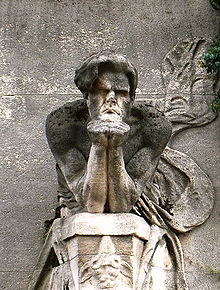
- Ô toi, le plus savant et le plus beau des Anges,
Dieu trahi par le sort et privé de louanges, - Ô Satan, prends pitié de ma longue misère!Ô Prince de l’exil, à qui l’on a fait tort
Et qui, vaincu, toujours te redresses plus fort,Ô Satan, prends pitié de ma longue misère!Toi qui sais tout, grand roi des choses souterraines,
Guérisseur familier des angoisses humaines,Ô Satan, prends pitié de ma longue misère!Toi qui, même aux lépreux, aux parias maudits,
Enseignes par l’amour le goût du Paradis,Ô Satan, prends pitié de ma longue misère!- O wise among all Angels ordinate,
God foiled of glory, god betrayed by fate,
Satan, O pity my long wretchedness!
O Prince of Exile doomed to heinous wrong,
Who, vanquished, riseth ever stark and strong,
Satan, O pity my long wretchedness!
Thou knowest all, proud king of occult things,
Familiar healer of man’s sufferings,
Satan, O pity my long wretchedness!
Thy love wakes thirst for Heaven in one and all:
Leper, pimp, outcast, fool and criminal,
Satan, O pity my long wretchedness!- “Les Litanies de Satan” [Litanies of Satan]
- O wise among all Angels ordinate,

- Gloire et louange à toi, Satan, dans les hauteurs
Du Ciel, où tu régnas, et dans les profondeurs
de l’Enfer, où, vaincu, tu rêves en silence!
Fais que mon âme un jour, sous l’Arbre de Science,
Près de toi se repose, à l’heure où sur ton front
Comme un Temple nouveau ses rameaux s’épandront!- Satan be praised! Glory to you on High
where once you reigned in Heaven, and in the
Pit where now you dream in taciturn defeat!
Grant that my soul, one day, beneath the Tree
of Knowledge, meet you when above your brow
its branches, like a second Temple, spread!- “Les Litanies de Satan” [Litanies of Satan]
- Satan be praised! Glory to you on High
- Quelle est cette île triste et noire? — C’est Cythère,
Nous dit-on, un pays fameux dans les chansons
Eldorado banal de tous les vieux garçons.
Regardez, après tout, c’est une pauvre terre.- What is that sad, black island like a pall?
Why, Cytherea, famed in many a book,
The Eldorado of old-stagers. Look:
It’s but a damned poor country after all!- “Un Voyage à Cythère” [A Voyage to Cythera], lines 5-8, trans.
- What is that sad, black island like a pall?
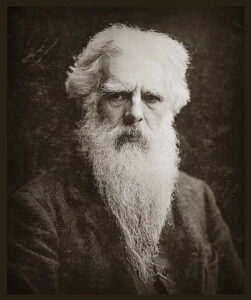 And today is the birthday of Eadweard Muybridge (born Edward James Muggeridge; Kingston upon Thames, Surrey, England 9 April 1830 – 8 May 1904 Kingston upon Thames); photographer known for his pioneering work in photographic studies of motion, and early work in motion-picture projection. He adopted the first name “Eadweard” as the original Anglo-Saxon form of “Edward”, and the surname “Muybridge”, believing it to be similarly archaic.
And today is the birthday of Eadweard Muybridge (born Edward James Muggeridge; Kingston upon Thames, Surrey, England 9 April 1830 – 8 May 1904 Kingston upon Thames); photographer known for his pioneering work in photographic studies of motion, and early work in motion-picture projection. He adopted the first name “Eadweard” as the original Anglo-Saxon form of “Edward”, and the surname “Muybridge”, believing it to be similarly archaic.
At the age of 20 he emigrated to the United States as a bookseller, first to New York City, and eventually to San Francisco. In 1860, he planned a return trip to Europe, and suffered serious head injuries in a stagecoach crash in Texas en route. He spent the next few years recuperating in Kingston upon Thames, where he took up professional photography, learned the wet-plate collodion process, and secured at least two British patents for his inventions. He returned to San Francisco in 1867, a man with a markedly changed personality. In 1868, he exhibited large photographs of Yosemite Valley, and began selling popular stereographs of his work.
In 1874, Muybridge shot and killed Major Harry Larkyns, his wife’s lover, but was acquitted in a controversial jury trial, on the grounds of justifiable homicide. In 1875, he travelled for more than a year in Central America on a photographic expedition.
Today, Muybridge is best known for his pioneering chronophotography of animal locomotion between 1878 and 1886, which used multiple cameras to capture the different positions in a stride, and for his zoopraxiscope, a device for projecting painted motion pictures from glass discs that pre-dated the flexible perforated film strip used in cinematography. From 1883 to 1886, he entered a very productive period at the University of Pennsylvania in Philadelphia, producing over 100,000 images of animals and humans in motion, occasionally capturing what the human eye could not distinguish as separate moments in time.
During his later years, Muybridge gave many public lectures and demonstrations of his photography and early motion picture sequences, travelling frequently in England and Europe to publicise his work in cities such as London and Paris. He also edited and published compilations of his work, some of which are still in print today, which greatly influenced visual artists and the developing fields of scientific and industrial photography. He retired to his native England permanently in 1894. In 1904, the year of his death, the Kingston Museum was opened in his hometown, and it continues to house a substantial collection of his works in a dedicated gallery.
Gallery
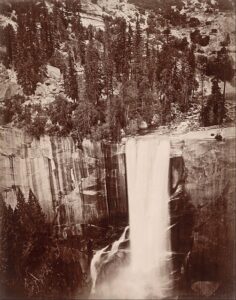
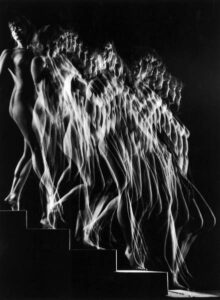
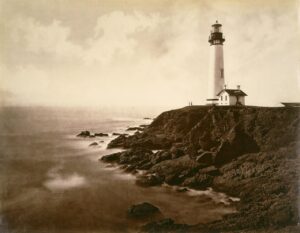
Mac Tag

No Comments on "The Lovers’ Chronicle 9 April – last time – verse by Baudelaire – photography by Eadweard Muybridge"